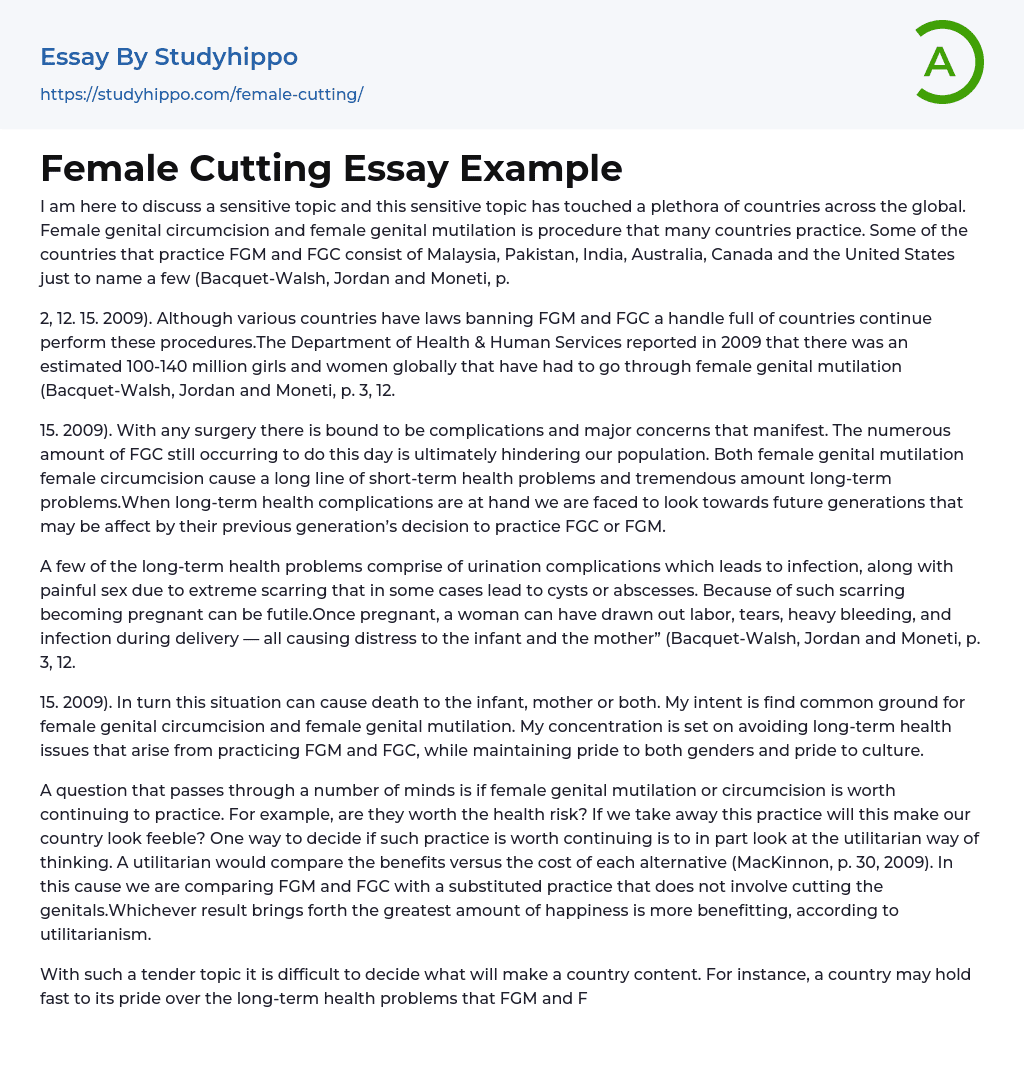The topic of female genital circumcision and mutilation is a crucial issue that affects various countries worldwide, including Malaysia, Pakistan, India, Australia, Canada, and the United States. Addressing this sensitive matter is essential (Bacquet-Walsh, Jordan and Moneti, p.).
Although many countries have laws prohibiting female genital mutilation and cutting, a few nations continue to perform these dangerous procedures. The Department of Health & Human Services reported in 2009 that around 100-140 million females globally have undergone female genital mutilation (Bacquet-Walsh, Jordan and Moneti, p. 3, 12.15.2009).
In 2009, it was noted that surgeries often come with complications and significant worries. The ongoing prevalence of female circumcision and genital mutilation in modern times is holding back our population. Both practices lead to a host of short-term health issues, as well as significant long-term problems.
...When such lasting complications arise, we must consider the potential impact on future generations affected by the choices of their ancestors to engage in FGC or FGM.
Long-term health problems may include difficulties with urination, which can result in infections, and painful intercourse due to severe scarring that may cause cysts or abscesses. Pregnancy can also be difficult, as scarring may make it futile. [Furthermore,] pregnant women may experience prolonged labor, tears, heavy bleeding, and infections during delivery – all generating distress for both the mother and the infant (Bacquet-Walsh, Jordan and Moneti, p. 3, 12).
One issue is that female genital mutilation and circumcision can lead to death of the mother or infant (15, 2009). The goal is to find a middle ground between the two practices, prioritizing avoidance of long-term health risks while still honoring cultural and gender pride.
There is much debat
surrounding the continuation of female genital mutilation or circumcision, with some questioning whether the associated health risks are acceptable and if ending the practice would make our country appear weak. Utilitarian thinking can provide a useful approach to answering this question by comparing the benefits and costs of different options. By considering alternative practices that do not involve genital cutting, it is possible to determine which option results in the greatest amount of happiness - as utilitarianism suggests that this is the most beneficial choice (MacKinnon, p. 30, 2009).
Although cultural pride may be highly valued in relation to female genital mutilation and cutting (FGM/FGC), its impact on future generations, women, and children must be taken into consideration. The long-term health risks associated with FGM/FGC, including pregnancy difficulties and complications that increase maternal mortality rates, can result in fathers becoming single parents and children losing their mothers – a situation that no one wants.
Based on the utilitarian perspective, neither FGM nor FGC would be considered worth practicing since it does not generate the maximum amount of pleasure. Barbara MacKinnon, the writer of Ethics: Theory and Contemporary Issues, explains that pain is essentially negative, while pleasure is intrinsically positive. In her book, she further discusses that an action that results in pain may be accepted only if it eventually creates more pleasure for all concerned parties (MacKinnon, p. 33, 2009). Nevertheless, genital cutting does not bring about overall happiness for girls and women who undergo the procedure since it causes both physical and psychological pain.
Alleviating the pain experienced by women and girls from genital cutting through finding a common ground will morally justify the practice and ultimately
lead to the complete termination of FGM and FGC.
- Values of Life essays
- Ethical dilemma essays
- Normative Ethics essays
- Virtue Ethics essays
- Belief essays
- Deontology essays
- Moral essays
- Virtue essays
- Work Ethic essays
- Anatomy and Physiology essays
- Addiction essays
- Biodegradation essays
- Dental Care essays
- Disease essays
- Disorders essays
- Health Care essays
- Intelligence Quotient essays
- Nutrition essays
- Olfaction essays
- Public Health essays
- Women's Health essays
- World health organization essays
- Cancer essays
- Infectious Disease essays
- Lung Cancer essays
- Neurology essays
- Physical Exercise essays
- Medicine essays
- Sex essays
- Inquiry essays
- Disability essays
- Poison essays
- Action Potential essays
- Nervous System essays
- Childbirth essays
- Puberty essays
- Blood essays
- Kidney essays
- Neuron essays
- Body essays
- Glucose essays
- Sense essays
- Heart essays
- Skeleton essays
- Human Physiology essays
- Eye essays
- Immune System essays
- Muscle essays
- Skin essays
- Brain essays




